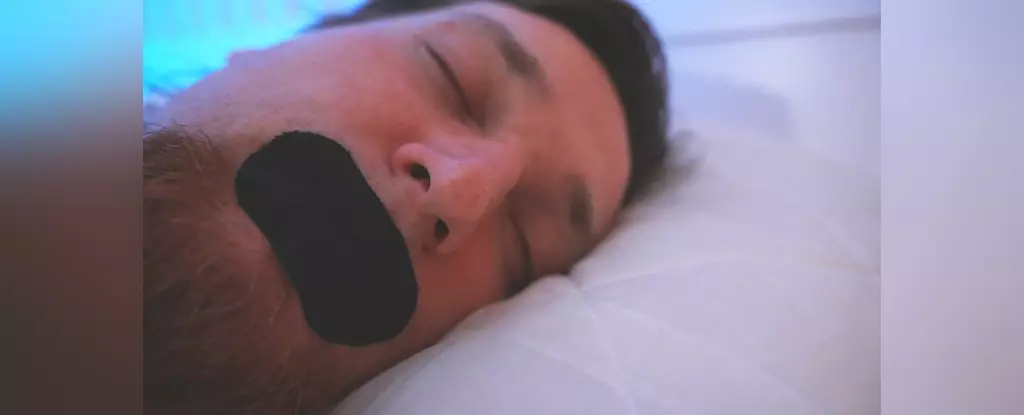The modern world is inundated with social media, where attention-grabbing trends often distract us from more substantive medical solutions. Among these is the phenomenon of mouth taping, popularized by influencers in bite-sized TikTok videos who tout its myriad benefits—ranging from enhanced jawline definition to improved energy levels and even relief from obstructive sleep apnea. This sensationalistic approach, however, hides a grim reality: quick fixes seldom deliver the promised long-term benefits, especially when it comes to complex health issues like sleep disorders.
For many, the discomfort of waking in a fog, plagued by interrupted sleep cycles and the persistent sound of their or their partner’s snoring can be maddening. The quest for a seamless, albeit superficial solution like mouth taping reflects a larger societal problem: the tendency to prioritize instant gratification over rigorous scientific validation. The gloss of viral trends can eclipse the necessity for sound medical advice, which raises significant concerns about the efficacy and safety of such methods.
Mouth Taping: Fact or Fallacy?
Upon diving deeper into the scientific literature surrounding mouth taping, it becomes clear that the evidence supporting its effectiveness is frail at best. Entering the realm of formal medical studies reveals a nuanced narrative largely absent from flashy social media clips. While two particular studies indicated minor improvements in specific patient cohorts suffering from mild sleep apnea, the overarching consensus remains painfully clear: the research supporting mouth taping is markedly poor in quality and insufficient for blanket endorsement.
Many studies examining this method either failed to account for confounding variables or involved demographics that lacked representational diversity. This raises the specter of flawed conclusions drawn from small, unmonitored groups where the variables were more telling than the outcomes. Notably, the caveat is stark: mouth taping can pose grave risks for individuals with nasal obstructions, which is where numerous cases of mouth breathing originate. Taping one’s mouth shut isn’t just ineffective in such situations—it could potentially escalate health complications, including asphyxiation.
The Complexity of Sleep Disorders
Let us be clear: sleep disorders are multifaceted issues often caused by an amalgamation of factors, and treating the symptoms without addressing the underlying problems is akin to putting a band-aid on a gaping wound. The allure of a simple method to remedy the complex labyrinth of obstructive sleep apnea or chronic mouth breathing helps nobody, especially those who could greatly benefit from proper diagnosis and treatment.
Individuals struggling with sleep apnea or other serious conditions require comprehensive medical assessments to identify the root causes of their symptoms—be they anatomical, psychological, or physiological. Relying on gimmicky remedies like mouth taping can divert attention away from these substantive avenues of exploration and treatment, delaying intervention that may drastically improve quality of life.
The Dangers of Medical Distraction
The real peril of trendy solutions like mouth taping lies not merely in inefficacy but also in the potential distractions they create from legitimate medical treatments. In a time when people are increasingly looking online for guidance due to ease and accessibility, a deep-seated skepticism toward anecdotal “success” stories is vital. Engaging in such practices without expert consultation may dissuade individuals from pursuing necessary examination and intervention.
What’s more concerning is the community surrounding these social media trends. The engaged audiences on platforms like TikTok often show an alarming propensity to embrace viral solutions with blind faith, ignoring the nuances essential for informed decision-making. This underscores a larger issue within public health: as misinformation proliferates, trust in professional medical advice wanes.
The message is clear: while the temptation of a viral remedy can be strong, the careful, deliberate path of visiting a healthcare professional is substantiated by far more reliable outcomes. Prioritizing thorough understanding over fleeting trends is essential when it comes to health—a principle that should guide us as we navigate through the often-turbulent waters of wellness advice.


Leave a Reply